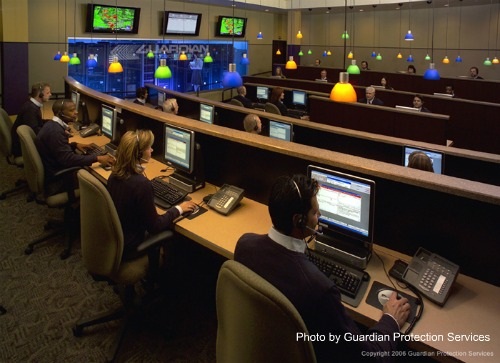- Home
- Compare Systems
- Cheap Systems
- Free Quotes
- DIY Systems
- Hardwired Systems
- Wireless Systems
- Smoke Detectors
- Medical Alarms
- Alarm Monitoring
- Cameras & Video
- Ademco
- ADT Security
- Brinks Security
- Broadview
- DSC Security
- FBI Alarms
- GE Security
- Honeywell
- Link Interactive
- Monitronics
- Moose
- Napco
- Protection 1
- Radionics
- Simplisafe
- Alarm Manuals
- Alarm System Parts
- Alarm Tools
- Troubleshooting
- FAQ
- Glossary
- Sitemap
- About Me
- Contact Me
How Home Monitoring Systems Offer Peace of Mind
They're Not Just "Burglar Alarm Systems" Anymore!
Home Monitoring Systems and Alarm Signals
The primary purpose of home monitoring systems is to send alarm signals in case of a burglary, fire, or other urgent event. This is what most people see as the “value” of an alarm system. Really though, what you are getting is “peace of mind”.
How do you get “peace of mind”? It helps to know what’s going to happen when the alarm is tripped. Many customers I’ve dealt with over the years have only a vague idea of what goes on when an alarm occurs, especially those that have never had a system before.
In case you didn’t know, here is the typical sequence of events when home burglar alarm systems are tripped:
Home monitoring systems in most cities don’t send signals directly to the authorities.
Instead, they go to a central monitoring station where the information comes up on a computer screen for an operator.
The 24-hour staff is trained to deal with signals from many types of alarm equipment, and they may talk to dozens of alarm customers and dealers during a shift.
The operator will see your name and address, as well as the alarm signal sent by your panel. Alarm signals are prioritized; Fire comes first, then Panic, followed by Burglary.
The operator will typically call your home first, giving you a chance to give your password.
This is a pre-arranged word you choose that tells the operator everything is all right.
If you don’t answer the call, or fail to give the correct password, the central station operator will notify the authorities. Most stations also notify anyone you have listed as trusted family members, friends, or neighbors. If you’ve given anyone on your list a key to your house, along with a valid alarm code, they can meet authorities on the house.
Police will usually contact the central station, telling them what they found at the premises.
All of this activity is logged in the central station computers. This allows you to find out later exactly what signals were involved, what action was taken, and who was contacted.

Maintenance Signals
Home monitoring systems also transmit signals when they sense problems within the equipment itself. These maintenance reports alert you that service may be required.
If you have a vacation home or other part-time residence, home security alarm monitoring is a very good idea. Alarms and trouble conditions are reported to the monitoring station 24 hours a day, even while you’re not at the house. Alarm monitoring companies let you specify who should be notified for which kinds of signals.
Alarm panels have a battery inside to run the system during a power outage. These back-up batteries have a life span of about 3 to 5
years. When they fail, the keypads will beep to signal a low battery condition. Alarm panels also beep for other trouble conditions, including blown fuses and damaged wiring.
This is all fine if you’re there to hear the beeping keypads; but if you’re gone for long periods of time, what’s next? The “low battery” may die completely, or parts of the system won’t be able to signal an alarm condition. Either way, your home may be left partially or completely unprotected.
Alarm monitoring systems prevent all of this. Instead, you get a real-time link to what’s going on in your home. If anything goes wrong at the house, you’re never more than a phone call away.
Opening and Closing Reports
Home monitoring systems can do more than just communicate alarms and maintenance signals. Most security panels can also be programmed to send two other useful signals:
Opening and Closing reports tell the central station whenever the system is armed and disarmed. Originally intended for alarms in businesses, this feature is also useful for residences. You can use it for tracking the comings and goings of cleaning crews, house sitters, property managers, realtors, and anyone else. You can identify each user by assigning them each a different arm/disarm code.
How useful is this? I had one customer call to ask for her open/close activity. She had hired a cleaning crew, which came every two weeks while she was away. They were supposed to be doing a thorough cleaning of the house. But, she noticed that the house wasn’t looking very clean.
You can see where this is going. The report showed that the “cleaning crew” was only in her house for less than an hour! Needless to say, she dismissed them…
To learn more on these signals, see this page on "How to Use Opening and Closing Reports."
Environmental Conditions
Home monitoring systems can also detect environmental signals, with the proper sensors. Any home left unoccupied for days at a time can have things go wrong: Water heaters and supply lines can develop leaks, and pipes can freeze and burst. These events can cause thousands of dollars in water damage.
A power failure can leave a house too hot, or cold to the point of freezing. Without power, refrigerators and freezers shut down, leaving food to spoil.
Sensors can be added to home monitoring systems that will detect high or low temperatures, water leaks, power failures, and other conditions. The alarm panel can report these problems when they occur, so action can be taken right away.
Temperature Sensors can be added to most systems. These can be set to trigger above or below a certain temperature, so they can be adjusted to fit your situation.
For example, maybe you live in a cold climate. If the furnace were to fail, you could be alerted before the temperature in the house dropped to freezing, preventing damage to plumbing pipes.
Or, you may have some expensive wine stored in a cooler. If the chiller quit working, you could be notified before heat ruins your collection.
Leak Detectors are usually placed on the floor in low spots in the house. If a pipe bursts, the water is sensed by the detector and triggers an alarm. This could save your wood flooring, carpeting, and furniture from irreparable damage, if it’s caught early.
Learn more about how an environmental zone can be part of a Custom Security System.
Related Articles:
Should You Self Monitor Your Alarm System?
Return to Home-Security-Systems-Answers from Home Monitoring Systems
Return to Home Alarm System Monitoring from Home Monitoring Systems
Note: Feel free to print any of the articles on this site for personal, non-commercial use. Just look for this button:
If you found this website especially helpful, you might want to consider making a small donation. Since 2011, AzAlarmGuy has been providing free help and advice on home security systems to all of those in need.
Your gift, in any amount, will help me keep this website a free resource for anyone needing help with alarm system issues or questions.
Disclosure
I receive affiliate commissions from some of the companies and products I discuss. These commissions don't change the price that you pay.
Rest assured that this compensation does not influence my recommendations. I only endorse products and services that I truly believe to be an honest value for you, as a visitor to my site.
For more details, see my full disclaimer.





